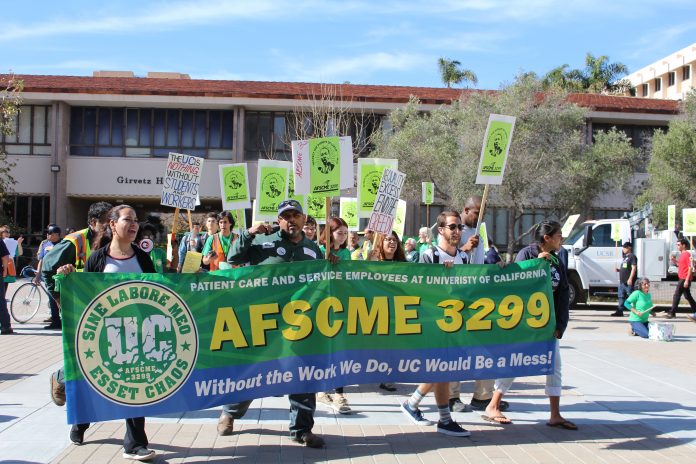After a year of failed contract negotiations, over 50,000 workers from across the UC system will unite from May 7 to May 9 to protest the UC system’s refusal to meet their demands. Healthcare, service, and research workers from three unions are striking the unfair wages, growing income inequality, and outsourcing of labor that has resulted from the continuous prioritization of the UC system’s bottom line. The administrations of each campus, and the UC system as a whole, have continuously sought to undermine worker security to ensure a cheap and obedient labor force, but this ever-contentious and precarious approach is finally reaching a head. This strike fights against more than just the worker’s individual rights, though; it combats the growing commercialization of higher education which has been pushing universities to follow a corporate path for decades.
Members of the American Federation of State, County and Municipal Employees 3299, the largest labor union representing workers in the UC system, have recently rejected the paltry offer of a 3 percent wage increase and a lump sum pay-out of $750 per worker. The offer seems so generous as to increase worker wages at all, but members of the union were quick to point out that this offer does little to address their grievances.
The decision to strike follows a report that found that the UC system perpetuates the growing income inequality of women and workers of color. It reported that women of color earned about 20 percent less than white male workers in the same job. Also, the UC system outsources nearly 7,000 contract laborers for work that could have been done within the system so that it can pay these workers $8.50 per hour less than union workers. These factors compound to unsettle the job security and general welfare of UC employees. To solve these issues, the union leaders are requesting a six-percent wage increase across the board, a freeze on their healthcare premiums, and an end to the outsourcing of labor.
The issues of income inequality, living wages, unsafe and unfair work conditions, and outsourcing of labor are all symptoms of a larger disease rotting the UC system from the inside out. Higher education has increasingly pursued a corporate model where costs are low and the bottom line is high. As a response to the state’s egregious underfunding of education, the Regents of the UC system trade the socioeconomic well-being of their workers to stave off the uncomfortable situation of having to lobby for more funding. Undermining the job security and welfare of workers is the simplest way to drive down labor costs; insecure workers are less likely to put up a fight since their economic security is already on such shaky ground. This ambitious approach comes straight out of the playbook for major corporations, but in this case, it has not been so easy. So, this strike not only combats the relegation of the rights of workers in the UC system, it fights the growing commercial mindset in higher education.
Commercialization of higher education represents more than just the growing presence of private corporations on UC campuses. Rather, it is an entire state of mind. Commercialization is when the Regents decide to increase tuition on students rather than lobby for funding. Commercialization is when campuses forgo the tenure track for professors to avoid paying the benefits. Commercialization is when the UC system hunts down the cheapest form of labor to meet their needs regardless of the fallout. UC administrations are institutionalizing a model of higher education that more closely resembles a corporate boardroom than a social service. Of course, the economics are not irrelevant; the universities cannot bankrupt themselves to supply an education. But the solution to the system’s woes is not to shift them onto low-income workers and students like some dystopian microeconomics lecture.
Higher education is increasingly becoming transactional; students are the customers and education is the product. As in every business, labor costs present the most troubling concern for the bottom line. But higher education as a public service is meant to serve a societal purpose, not a corporate interest. It intends to enlighten our population and bolster our workforce, so ignoring the human consequences of this service undermines that goal. Just as it is imperative that workers’ strike when their conditions are unfair, it is imperative that the UC system seek to maximize its public good.








